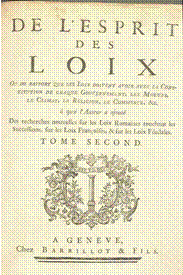

•Separation of powers
•identified three sorts of governmental power:
legislative, executive and judiciary.
•believed that if one person or
group of people held any two or all three of these powers, it would
result in “tyrannical laws” executed in a “tyrannical manner.”
•Constitutional monarchy
•did not believe that democracy
was the best form of government.
•instead, he favored a
constitutional monarchy based on the British model.

Frontspiece to The Spirit of the Laws